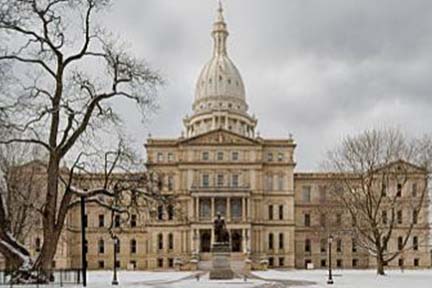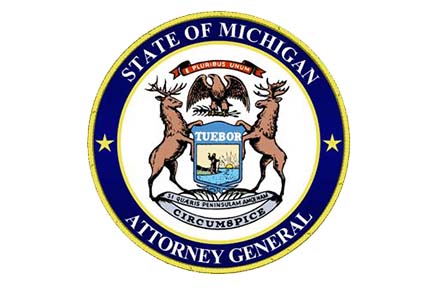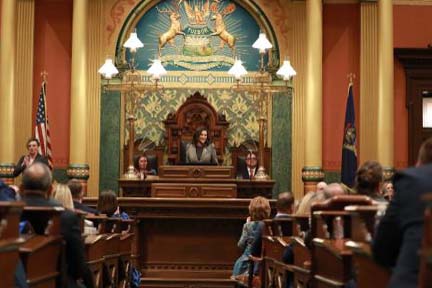
MPSC Disallows $30 Million in DTE Electric’s Cost Recovery
|
|

|
|


FOR IMMEDIATE RELEASE
March 6, 2025 Contact: [email protected] Gov. Whitmer Makes Appointments to the Bench LANSING, Mich. —Today, Governor Gretchen Whitmer announced the upcoming appointment of Andrew Stevens to the 65-A District Court in Clinton County.
“I’m proud to appoint Andrew to the bench in Clinton County,” said Governor Whitmer. “As a former prosecutor in Ingham County myself, I know that he brings decades of invaluable experience to the position. Andrew will keep families safe and uphold the rule of law.”
65-A DISTRICT COURT- CLINTON COUNTY
Andrew Stevens is currently an assistant prosecutor at the Ingham County Prosecutor’s Office, where he has served for over fifteen years. In this role, Stevens has held various professional assignments and currently serves as the District Court Unit Chief, supervising attorneys and acting as a resource and homicide prosecutor in the Complex Crimes Division. Stevens is also involved in community and educational initiatives. He serves on the Lansing Community College—Eaton Regional Education Service Agency Advisory Committee and is a presenter for the Michigan State University Police Department Citizens Academy.
Andrew Stevens holds a Bachelor of Arts in political science from Michigan State University and a Juris Doctor from the Michigan State University College of Law.
“I humbly thank Governor Whitmer for this incredible honor and distinction,” said Andrew Stevens. “Every day of the past fifteen years, it has been my privilege to represent the People of the State of Michigan and uphold the vow of justice. I look forward to continuing that commitment as I boldly serve the residents of Clinton County on the 65A District Court.”
This appointment will be made to fill a partial term following the resignation of Judge Michael Clarizio. Judge Stevens’s term will commence on April 14, 2025, and expire at twelve o’clock noon on January 1, 2027.
|

|
|


FOR IMMEDIATE RELEASE
February 26, 2025 Contact: [email protected]
Gov. Whitmer Delivers 2025 State of the State Address Lowering costs of housing, medical debt, energy, and child care amid threat of tariffs Investments to help young Michiganders get skills, find good jobs, provide for their families Commonsense plans to streamline permitting & licensing, improve student academic results & health
LANSING, Mich – Today, Governor Gretchen Whitmer delivered her 2025 State of the State Address in front of a joint session of the Michigan Legislature, where she focused on the importance of working with anyone to get things done for Michiganders. She laid out her plans to lower costs for Michigan families, create more good-paying Michigan jobs, and continue delivering results for Michigan taxpayers. The State of the State builds on her Road Ahead Address where, prior to President Trump’s inauguration, she shared her commonsense, bipartisan vision to grow the economy and strengthen the auto industry in anticipation of tariffs. The speech also comes on the heels of her meeting with President Trump where she advocated for Michigan manufacturing and military families.
“In 2025, I’m excited to keep working across the aisle to lower costs, create jobs, and continue delivering results that make a real difference in people’s lives,” said Governor Whitmer. “Right now, families and businesses are facing high costs and uncertainty from tariffs and our national politics are divided. Michiganders are tired of the games and want strong, bipartisan leadership. Let’s lead by example and show the rest of the country how to get things done.”
“Governor Whitmer and I are committed to building a Michigan where every person can be their best selves and access health and wealth,” said Lt. Governor Garlin Gilchrist II. “When we took our oaths, we promised a responsive government that would listen to every Michigander, and this address includes stories and words from Michiganders across our state. This year, we’ll continue focusing on lowering costs, growing Michigan’s economy, and making government more efficient and effective for every Michigander. Let’s keep standing tall for Michigan.”
Governor Whitmer’s 2025 State of the State Address centered stories from Michiganders across the state who all want the same things: a good education, an affordable place to live, more money in their pocket, and a fair shot at a great life.
“Governor Whitmer made herself loud and clear tonight: our collaborative efforts to drive Michigan forward are working,” said Senate Majority Leader Winnie Brinks (D-Grand Rapids). “Since the onset of our Senate Democratic Majority, we’ve worked in tandem with the governor and House to forge a better future for our residents — from expanding civil rights protections and reproductive rights to delivering the largest tax relief plan in state history and making sure no Michigan student goes hungry at school. But our work is not done yet — we’ll continue fighting to lower costs, foster opportunity, and improve our quality of life. And we’ll remain open to working with anyone who puts the real needs of our residents first and foremost. We’re in your corner, and together, we’ll continue to prove to the rest of the country just how great it is being a Michigander.”
“The State of the State Address is always a monumental occasion full of energy and excitement — and tonight did not disappoint. With all three branches of government present, we recognized the sacred balance of our state’s power and the strength of Michigan’s democracy, as dysfunction reigns at the federal level,” said House Democratic Leader Ranjeev Puri (D-Canton). “As House Democratic Leader, my focus is on bringing to life a vision for our state in which all Michiganders can sleep more soundly knowing that they and their family members are safe, secure, and succeeding. For regular, everyday people, that vision looks like lower costs, affordable housing, accessible child care, and strong infrastructure. At the state level, we need to make Michigan more resilient than ever to combat the tariffs, chaos, and cuts coming down from D.C. I am confident that my fellow House Democratic colleagues and I are united in building Michiganders up so that we can weather any and all storms. We are ready to make our Great Lakes State better than ever.”
Key Lines from the Speech: Lowering Costs for Michigan Families Michigan families and businesses are facing high costs on the essentials right now. President Trump’s proposed 25% tariffs on our closest trading partners would slow down the construction of homes and factories, lead to thousands of layoffs on the auto assembly line, and jack up costs for families by an average of $1,200 a year as companies pass their costs on to consumers.
Governor Whitmer will work with anyone to protect Michigan’s economy against policies that would raise prices and cut jobs. The governor highlighted investments she’s proposed in her budget to cut taxes for seniors and working families, build more housing to lower rents and mortgages, expand assistance on energy bills, and expand quality, affordable child care for working moms and dads.
“I am extremely pleased to see Governor Whitmer propose funding to help pay off medical debt for Michiganders,” said Warren Evans, Wayne County Executive. “Our program in Wayne County has been extremely successful in helping residents in need and I look forward to seeing a state-wide program helping more people across the state. Easing debt ensures that people can keep more money in their pockets, which helps keep the lights on and put food on the table.”
“Governor Whitmer’s call to action on medical debt is a transformational change for Michigan residents as they deal with both the financial and physical stress of health emergencies,” said Oakland County Executive David Coulter. “The first round of our program in Oakland County has wiped out more than $9 million in medical debt for 14,000 residents and that’s just the start of the relief to come, helping families focus on what’s really important – getting healthy.”
Key Lines from the Speech: More Jobs, More Skills, More Money Governor Whitmer wants to make it as easy as possible for every Michigander to get the skills or education they need to get a good-paying jobs so they can earn more money and protect and provide for themselves and their families.
“MI Reconnect has been a game-changer for expanding educational opportunities in Michigan,” said Brandy Johnson MCCA. “However, the fact that women currently outnumber men 2-to-1 in our enrollment highlights a critical gap. The governor’s directive to actively reach out to young men is essential for ensuring that every Michigander can take advantage of these tuition-free pathways.”
“At Selfridge Air National Guard Base, Michigan service members and their families step up every day to defend our communities and our country,” said U.S. Army Maj. Gen. Paul D. Rogers, adjutant general and director of the Michigan Department of Military and Veterans Affairs. “It’s up to us to support them and have their backs by investing in Selfridge’s infrastructure and winning a new next-generation fighter mission. Michigan’s defense and national security leadership grows our economy and supports our military families. Governor Whitmer and I will keep fighting for Selfridge and working hard to keep Michigan in the lead on national security.”
“Selfridge is Michigan’s hometown airbase, and plays a critical role in our state’s military advantage,” said Macomb County Executive Mark Hackel. “It’s imperative Michigan continues to lead the future of national security and defense through Selfridge. Investing $100 million in Selfridge is necessary to help secure its next fighter mission. Working together we will continue to protect and grow Michigan’s military advantage.”
“During my entire public service career, I have been proud to fight for Selfridge and the brave men and women who serve there,” said Macomb County Public Works Commissioner Candice S. Miller. “Selfridge is the centerpiece of Michigan’s defense ecosystem and supports thousands of high-skilled jobs and military families. I support the state’s continuing investment in Selfridge, and we must all continue to work towards bringing a new fighter mission to Selfridge.”
Key Lines from the Speech: Results Since taking office, Governor Whitmer has taken action to cut red tape, streamline government, and make state government more effective, efficient, and responsive for Michiganders. But there is still more to do so we can build stuff faster, create jobs, and improve results for students and parents.
“Improving permitting and licensure isn’t just about cutting red tape, it’s about creating an environment where innovation and growth can flourish,” said state Senator Kevin Hertel (D-St. Clair Shores). “The governor’s emphasis on streamlining procedures and refunding unnecessary fees will not only boost economic activity, but will ensure that our regulatory processes protect both our communities and the environment.”
“When it comes to improving student outcomes in our state, we need to look at all of the factors that may be holding our kids back,” said Terrence Martin Sr., President of AFT Michigan. “By supporting local school districts curb cellphone use in classrooms, we can help keep our students on the right track, improving mental health, test scores, graduation rates, and more.”
|


FOR IMMEDIATE RELEASE February 24, 2025 Contact: [email protected]
Lt. Governor Gilchrist and MiLEAP Celebrate PreK for All Success, Highlight Continued Investments for Michigan’s Youngest Learners
LANSING, Mich. – Lt. Governor Garlin Gilchrist II and the Michigan Department of Lifelong Education, Advancement, and Potential (MiLEAP) are celebrating the success of the PreK for All Initiative, which is helping Michigan families save money while preparing the state’s youngest learners for kindergarten. This milestone was marked today during in event with families at the South Lyon Early Childhood Center in southeast Michigan.
“Governor Whitmer and I are committed to ensuring that every child in Michigan receives the strong start they deserve,” said Lt. Governor Garlin Gilchrist II. “Thanks to PreK for All, we have witnessed record enrollment for 4-year-olds across our state, and we are building on that momentum. This is about investing in our kids’ futures, and we will continue collaborating with all partners to make sure every Michigan family has access to high-quality early education, no matter where they live.”
“PreK for All is truly transforming lives, making quality early learning more accessible than ever for Michigan families,” said Dr. Beverly Walker-Griffea, director of MiLEAP. “We are pleased to see so many families benefiting from these investments as their children grow academically and socially, all while keeping more money in their pockets. With the Governor’s budget recommendation, we will continue to expand lifelong education opportunities to ensure that every in child in Michigan has a solid foundation for success.”
“I strongly believe that no family should have to pay out-of-pocket for a high-quality preschool experience,” said Michael Lloyd, Principal at the South Lyon Early Childhood Center. “Continued investments in PreK for All means more families will have access to early education without the financial burden, ensuring every child can learn and grow in a supportive environment. Free preschool will have a lasting impact for families in our community, and with support from the state, we can make sure every Michigan four-year-old has a strong foundation for lifelong learning at this crucial stage of their development.”
Michigan’s PreK for All initiative saves families an estimated $10,000 per year in child care costs, putting an estimated $450 million back into Michigan families’ pockets this school year. The Governor’s recent budget recommendation builds on these efforts by:
In addition to the benefits for children and families, PreK for All benefits Michigan’s economy as a whole. A recent analysis from the Upjohn Institute found that for every dollar spent on the program, it creates $1.72 in total economic benefits for our state.
PreK enrollment for 2025-2026 school year will open soon. Families can learn more and find programs that fit their needs by visiting MiPreKforAll.org . For families seeking other child care options, visit the Great Start to Quality website.
|

|
|
|